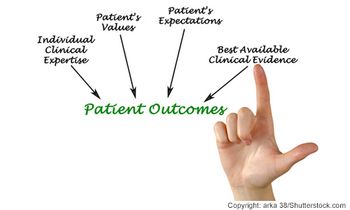
Enjoy the Quality, Not Quantity of Patient Visit
By: Georgia Newman, MD Spending more time listening and counseling my patients has been gratifying, so why dilute that by seeing more patients than I need to?
This spring, as influenza and viral upper repertory infections have waned, and the snowbirds have not yet flown back to Ohio, there have often been unfilled appointment blocks in my schedule. Initially, I was worried: volume down means income down, but there is a god of the schedule, and he/she is kind. Almost every time I have an unfilled slot, the patient before it is in some kind of crisis and needs more time. Job loss, recent bereavement, additional symptoms, significant stress, depression, uncontrolled diabetes, and moderate-morbid obesity are just a few examples.
Spending more time listening and counseling has been gratifying. I have been practicing behavioral motivational interviewing techniques:
• "…and on a scale of 0 to10, how likely do you think you will be able to walk four minutes three times a day?"
• "I hear that you would really like to lose weight and lower your blood sugar, but you really love bread."
Most of the time, I charge for the time counseling, but sometimes I am discovering that the physical laborer with severe chronic joint pain, now status/post lung cancer and forced retirement loves philosophy and reads Plato on his own; that the trucker I did CDL exams on every year is now happily running his own salvage yard; and that the 91-year-old will be joining his extended family for an Alaskan cruise this summer. These are connection times, not billable times.
The god of the schedule has been a vengeful, cruel god for most of my 40-year professional life. The demands of the busy schedule create frequent agenda conflicts: I struggle to get the A1C under control, the blood pressure down, the eye exam ordered, preventive health completed, while the patient has knee pain, insomnia, viral illness, etc. Trying to fit it all in during a 15-minute appointment slot is really stressful. As you read this, your own stress level is probably rising sympathetically. In addition, the more patients seen, the more prior authorizations, referrals, prescriptions, documents to review, labs to review, phone messages, and questions there are. At one point several years ago, I figured that I was spending two hours a day on paperwork, getting home late to my husband's mild resentment.
One of the only really good things about getting old is the swing from having to earn money for things like college education, mortgage, retirement, etc., to only needing to earn enough money to keep the practice afloat and to not be embarrassed. I watch physicians around me seeing 35 patients a day and am horrified. Seeing fewer patients is the key to finishing all the work and getting home at a reasonable hour with some energy to spare.
Although I have been a proponent of practice reform and innovation, I often find that the acute illnesses that should be relegated to the certified nurse practitioner are often opportunities to "better know the patient." If the future system has physicians seeing only the most complex and chronically ill, in the same 15-minute slots, then, unless we all become "conciergists" or are able to wrest back control of our own schedules (allowing those patients more time), the cruel god of the schedule will return.
Newsletter
Optimize your practice with the Physicians Practice newsletter, offering management pearls, leadership tips, and business strategies tailored for practice administrators and physicians of any specialty.








